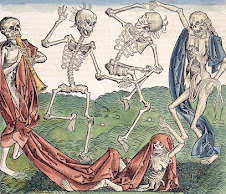Thursday, January 24, 2008
I read other people's blog before I wrote mine, so, to add on a little:
I had the idea that most people were quite religious and superstituous during the middle age, because lots of people did not have much 'science' to base how natural phenomenon come about. However, I was unaware about how commited and devoted they could be about their believes. "... no one should weaken in the firmness of their commitment to the way of life he has chosen, but should always strive to increase his commitment to this undertaking as if he were just starting out ..." (Athanasius, 16)
One thing I have not fully come across, but would like to learn, is the 'reasoning' for their religious belief. Did all these people choose Christianity for the 'afterlife', or were there other things they sought?
I had the idea that most people were quite religious and superstituous during the middle age, because lots of people did not have much 'science' to base how natural phenomenon come about. However, I was unaware about how commited and devoted they could be about their believes. "... no one should weaken in the firmness of their commitment to the way of life he has chosen, but should always strive to increase his commitment to this undertaking as if he were just starting out ..." (Athanasius, 16)
One thing I have not fully come across, but would like to learn, is the 'reasoning' for their religious belief. Did all these people choose Christianity for the 'afterlife', or were there other things they sought?
blog assignment
The readings have clearly converged with my belief that the world at large was in the dark as it relates to science and religion. In Wednesday's lecture is was stated that Augustine had a dream about the devil and referred to himself as being possessed. This explained why movies always depict priests so easily persecuting someone for being a heritic. Spirits had a big influence on the general population of the public and are used to express things that are outside their knowledge. which in tern creates an open door to religious fanaticism. In some ways that has not changed to this day. What did diverge from my preconceived notion of the middle ages was the hype that movies put on princesses in danger, and wars and conquest. The readings reveal that life is just as monotonous back then as it is now.
The readings show a more human side to people of the middle ages. In particular, the saints come accross as more human. For the most part, Augustine's "Confessions" show how he used to sin and kind of paint a picture of his movement from sinfulness to some sort of perfection. However, in book ten he talks about how he still fantasizes about having sex with many different women as he is sleeping. I feel that it shows that although he has fought off his sinful nature, he still has to deal with the urges of his past. He didn't simply discard his old habits with severe discipline. Rather, he seems to have managed a way to not act on these urges. He still wants to have sex with many partners, but he fights an inner battle not to sin.
The readings also confirm my perceptions of the middle ages as a time that was unsanitary compared to today's standards. The fever seems to be a common killer during that time. However, now after 3 days of medication and rest one can return to full health.
The commonality of the fever leads me to wonder whether or not the fever was used to name other illness that carried the similar symptoms, but were unknown at the time.
The readings also confirm my perceptions of the middle ages as a time that was unsanitary compared to today's standards. The fever seems to be a common killer during that time. However, now after 3 days of medication and rest one can return to full health.
The commonality of the fever leads me to wonder whether or not the fever was used to name other illness that carried the similar symptoms, but were unknown at the time.
I think there is a clear convergence with the struggle for spiritual identification and definition we see in the reading with what I believed to be true of the earlier parts of the Middle Ages. Something I believe to be overlooked quite often that divulges from my preconcieved notions is the way the people in the time period viewed the age in which they were living. In Early Christian Lives Athanasius describes how the pagan religions were essentially a deception made by the devil to trick the common man into thinking that he and his demons were holy and gods. On pg. 34 he says "Truly Jesus has utterly destroyed your powers ; stripped of your honours as an angell, you lie rolling in the mud." From this quote it seems that Christians at that time would not have viewed this time as a dark age, but instead as an enlightenment of sorts. This is the time when the devil's hold over man is weakening, and he is left "rolling in the mud".
Subscribe to:
Comments (Atom)
